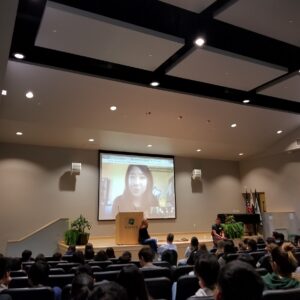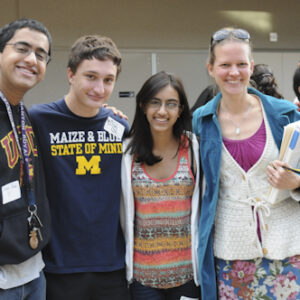This article originally appeared in the winter 2010 Harker Quarterly.
As the school year began, many families were faced with the task of adjusting to Harker life, and they found ample support from Harker faculty and staff to assist with the transition.
Kindergartners Sabrina and Sally Zhu attended a play-based pre- school before joining Harker in the fall. When asked by their mother, Hong Wei, where they would like to go to school, both said Harker “because they can learn more from Harker in many areas.”
They have found the balance between academics and fun to be refreshing. “Harker is fun because you learn, and it’s really even with playing and learning,” Sabrina said.
Andrew Pluzhnikov, another kindergartner, said Harker’s approach to teaching math was different from the method at his pre-school. His teachers, he said, helped him get used to the new method “with numbers and projects about numbers, like making a number line.”
Scott and Mary Hyver, parents of Ben, grade 5 and Emma, grade 3, brought their children to Harker after home-schooling them for a number of years. Prior to the start of the year, she and her children attended a buddy party hosted by Harker, during which her children were paired with buddies and learned more about the school. The buddies have helped new students during the year by helping them find classrooms, answering their questions and providing other general assistance.
Mary Hyver also received advice from other Harker parents, who discussed their routines and shared their experiences in dealing with homework and academic expectations. She was also able to find assistance when encountering bumps in the road. “Making friends and managing homework with after-school sports were particularly difficult,” she said. “The staff communicated regularly with my children and us and worked cooperatively, assisting my children with time management and social interactions on the playground and in the classroom.”
Emma Hyver said the new approach to testing was one of the major changes she had to get used to. “After practicing a couple of times, I am used to tests,” she said. “Similar to tests, changing classes just took practice.”
Support from teachers has been proven helpful for Ben Hyver. “They know that I’m not used to this because I was home-schooled,” he said. Their help has enabled him to become accustomed to student life and make more friends.
New student Kai-Siang Ang, grade 6, had to adjust to Harker’s academic emphasis after transferring from a public school. He found that the orientation on his first day of school helped him get accustomed to the new experience, “because it got me comfortable with the campus and teachers.” He has also had fellow students assist him in using online student resources and attended a party hosted by the McNealy family (Scout, grade 4; Colt, grade 6; Dakota, grade 7; Maverick, grade 10), where he was introduced to other students.
Though he initially found the experience “a little stressful,” he said that has now gotten settled in and is enjoying life as a Harker student. “Here we have a lot more courses I can take and I’m learning more on a daily basis.”
Irene Bashar, grade 6, also had to deal with a new workload and responsibilities after moving on from the lower school. She appreciated that the teachers “explained all the class material clearly so that you can understand it when you get back home,” and that “they try hard not to give you way too much homework” despite the new academic requirements.
Adjustment to a markedly different academic environment is something other parents have noted. “Harker is substantially more dialed in to the specific needs, social and academic, of our child,” said Lisa Chapman, mother of Julia Fink, grade 9, who started Harker in the fall. “There is a lot more accountability with respect to curriculum, status of her progress and her sense of inclusion.”
“Everybody here was really welcoming, and everybody was really helpful,” Fink recalled of her experience upon joining Harker this year. As an example, she mentioned that English teacher Erin Redfern frequently checks up on her progress and makes sure she is not causing herself too much stress.
Chapman said she found it refreshing that Harker faculty and staff were proactive in making sure that experience has been comfortable. “Everyone has been very gracious. Many [teachers and administrative staff] have inquired about how the experience is going thus far,” she said. “We appreciate that.”
Other parents advised Chapman to “get involved early. We attended events over the summer and met families, and converted that into get-togethers with our daughter and other kids. Those kids have become her good friends.”
“Harker can be a big shock to a lot of students from public schools in particular,” said Jeffrey Draper, upper school drama teacher and the dean of the Class of 2014. “As a teacher, it’s really fun to figure out who’s new, and work to have them feel like that’s not going to be a big deal as fast as possible.”
It’s not only academics that require adjustment. Students from other schools also have to deal with being new among students who have been attending Harker together for several years. “When there are so many Harker ‘lifers’ around them … once in a while those students have to fit in socially and find out where they are and acclimate themselves, in addition to their academics,” Draper said. Pairing up new students with those who have been at Harker for much longer, he said, is one way he accomplishes this goal. “There’s a lot of new stuff they have to deal with. Helping with that transition is one of the fun things I get to do.”
In addition to students from other schools, Harker students transitioning to a different campus also have certain responsibilities to learn and adopt. Freshmen moving to the upper school from middle school, for example, “get a lot more freedom … more than they’re used to, and sometimes they don’t know how to use that freedom,” Draper said. “But they figure it out pretty quickly.”
Students are reminded to sleep and eat well, and are coached on how to make smart choices for themselves. The structure of the K-12 program also provides ample preparation for the switch from middle school to upper school. “We just seem to do that well,” Draper said.











